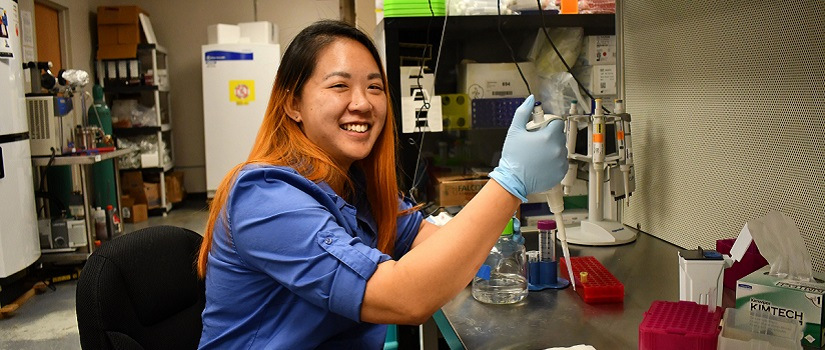According to the United States Bureau of Labor Statistics, there are more than 134,00 biologists and biomedical engineers in the country. Candice Cheung is currently pursuing her Ph.D. in biomedical engineering and hopes to join the growing field in a few years. When she joined an online community for biology enthusiasts two years ago, she never imagined she would eventually help turn it into a nonprofit to educate and impact thousands of lives.
Cheung grew up in Hong Kong and came to the University of South Carolina in 2018 for her master’s degree in biomedical engineering. She remained to pursue her Ph.D. and completed her third year of the program this past May. Cheung is currently researching drug-loaded biomaterials to accelerate recovery after muscle atrophy.
“Originally, I was interested in pursuing medicine, but after a veterinary clinical internship, I realized that I was more interested in the technology and instruments used in medicine rather than the medicine itself,” Cheung says.
While on Discord, a social networking and digital distribution platform, Cheung discovered the Biocord community for biologists and biology enthusiasts. She joined the group in 2020 when it only had around 250 members. Shortly afterward, Cheung became a moderator and is now a board member and chief administrative officer who is responsible for its administrative, legal and financial operations.
In only two years, the group has grown to more than 20,000 members and aims to bridge the gap between scientists and students. Members include high school, undergraduate and master's students, professors, and professionals working in biology fields. Approximately 40% of the members are from outside the U.S. and represent countries including Australia, England and India. The group is organized into several channels that provide designated spaces to discuss topics like career planning and homework assistance.
But as the community grew, Cheung and her team experienced some challenges. She sometimes found communication difficult between moderators, while managing the goals and expectations of each member.
“We’re all balancing academics and some of us are balancing research. None of us have any business or management experience, so there were a lot of growing pains,” Cheung says. “Operating as an organization has been very interesting. I’m now representing a business and not just myself.”
Cheung continues to see the impact that she and her team are having by connecting students to professionals in biology-related fields. Cheung and other moderators decided to expand their reach by registering Biocord Network as a 501(c)(3) nonprofit, allowing them to apply for grants and ask for sponsorships.
“It’s been very educational for me. I’m learning about entrepreneurship, and I’ve gotten better insight into the business side of science,” Cheung says. “It’s an interesting experience that a lot of people in science and engineering don’t always get.”
Cheung was a co-organizer for last year’s Biocord Network Summer Conference. The online event featured 31 speakers, including a keynote address from American cell biologist Randy Schekman, recipient of the 2013 Nobel Laureate in Medicine or Physiology. The conference drew more than 1,300 attendees worldwide. Cheung describes the four months planning the conference as one of the most stressful times in her life.
“I was working on that maybe 40 hours a week on top of working on research. It was very difficult to plan but we just felt that it was really important to help establish meaningful conversations on what a career in science is like,” Cheung says.
One of Biocord’s primary goals is to make higher education more accessible, especially for women and minorities. “During our first conference, I wanted to make a really big push for inclusivity, so I hosted the Diversity in STEM panel. I brought in a disabled gentleman that works for the EPA and Johnnie Jae, who is an advocate for Indigenous people in STEM,” Cheung says.
But Cheung admits that her favorite aspect of being a part of Biocord is to see the interactions between aspiring and current scientists worldwide.
“I've seen professors in the U.S. play video games with undergraduates, graduate students and high schoolers from Asia, Australia and Europe,” Cheung says. “It's fantastic that we've been brought together by this common ground.”
